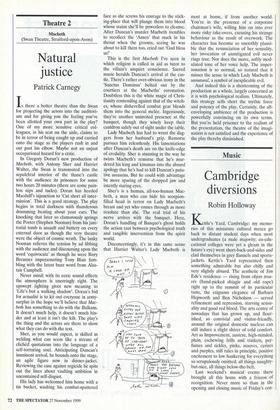Theatre 2
Macbeth (Swan Theatre, Stratford-upon-Avon)
Natural justice
Patrick Carnegy
Is there a better theatre than the Swan for projecting the actors into the auditori- um and for giving you the feeling you've been allotted your own part in the play? One of my more sensitive critical col- leagues, in his seat on the aisle, claims to be in terror of being caught up and carried onto the stage as the players rush in and out past his elbow. Maybe not an unjust occupational hazard for a critic.
In Gregory Doran's new production of Macbeth, with Antony Sher and Harriet Walter, the Swan is transmuted into the sepulchral interior of the thane's castle with the audience its prisoners for some two hours 20 minutes (there are some pain- less nips and tucks). Doran has heeded Macduffs injunction to 'Cut short all inter- mission'. This is a good strategy. The play begins in total darkness with thunderous drumming beating about your ears. The knocking that later so clamorously springs the Porter (Stephen Noonan) from his jani- torial tomb is assault and battery on every external door as though the very theatre were the object of cosmic wrath. The lanky Noonan relieves the tension by ad libbing with the audience and discoursing upon the word 'equivocate' as though he were Rory Bremner impersonating Tony Blair fum- bling with the latest buzz word from Alas- tair Campbell.
Never mind; with its eerie sound effects the atmosphere is unerringly right. The upswept lighting gives new meaning to 'Life's but a walking shadow'. Doran's bid for actuante, is to kit out everyone in army- surplus in the hope we'll believe that Mac- beth has something to do with the Balkans. It doesn't much help, it doesn't much hin- der and at least it isn't the kilt. The play's the thing and the actors are there to show what they can do with the text.
Sher, as you would expect, is skilled in welding what can seem like a stream of cliched quotations into the language of a self-torturing soul. Anticipating Duncan's imminent arrival, he bounds onto the stage, an agile figure now in dinner-jacket. Reviewing the case against regicide he spits out the lines about vaulting ambition in uncontained self-disgust.
His lady has welcomed him home with a tin bucket, washing his combat-spattered face as she screws his courage to the stick- ing-place that will plunge them into blood whose stains she'll be powerless to cleanse. After Duncan's murder Macbeth trembles to recollect the 'Amen' that stuck in his throat when the grooms, seeing he was about to kill them too, cried out 'God bless us!'
This is the first Macbeth I've seen in which religion is called in aid as tutor to the villain's unquiet conscience. Sacred music heralds Duncan's arrival at the cas- tle. There's rather over-obvious irony in the 'Sanctus Dominus' belted out by the courtiers at the Macbeths' coronation. Doubtless this is the white magic of Chris- tianity contending against that of the witch- es, whose dishevelled combat gear blends them into the general melee. Ingeniously, they're another uninvited presence at the banquet, though they wisely keep their cauldron safely out of sight under the table.
Lady Macbeth has had to wrest the dag- gers from her husband's grip. Remorse pursues him relentlessly. His lamentations after Duncan's death are on the knife-edge of credulity. Sher is stunning in the way he twists Macbeth's remorse that he's mur- dered his king and kinsman into the absurd apology that he's had to kill Duncan's puta- tive assassins. But he could with advantage be more sparing of the dropped jaw and intently staring eyes.
Sher's is a human, all-too-human Mac- beth, a man who can hide his scorpion- filled head in terror on Lady Macbeth's breast and yet who comes through as more resolute than she. The real trial of his nerve arrives with the banquet. Here, Doran's handling of Banquo's ghost holds the action taut between psychological truth and tangible intervention from the spirit world.
Disconcertingly, it's in this same scene that Harriet Walter's Lady Macbeth is most at home, if from another world. You're in the presence of a corporate chairman's wife, willing him on into ever more risky take-overs, excusing his strange behaviour as the result of overwork. The character has become so smoothly plausi- ble that the renunciation of her sexuality, her invocation of unmitigated evil never rings true. Nor does the suave, softly mod- ulated tone of her voice help. The imper- sonation is so normal, so natural that it misses the sense in which Lady Macbeth is unnatural, a symbol of inexplicable evil.
And indeed this is a shortcoming of the production as a whole, largely concerned as it is with psychological realism. Ultimately, this strategy sells short the mythic force and potency of the play. Certainly, the all- enveloping ambience of the production is powerfully convincing on its own terms. But you're held prisoner to the realism of the presentation, the theatre of the imagi- nation is not satisfied and the experience of the play thereby diminished.


























































































 Previous page
Previous page